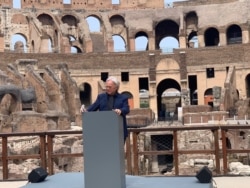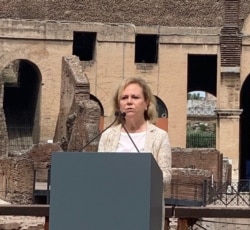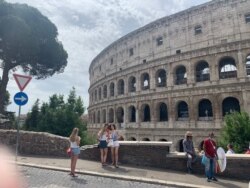A large, newly restored area of the Colosseum, which used to be the underground backstage of the ancient Roman amphitheater, is now accessible to the public for the first time. Visitors can use a newly constructed wooden walkway to admire the tunnels and chambers under the arena that were used by wild animals and human performers before they joined the action in front of large audiences.
A team of more than 80 experts, including archaeologists, engineers and restorers, worked on the Colosseum’s hypogeum for two years. The project was the second phase in a major restoration of the iconic landmark that began in September 2013. Funding was provided by Diego Della Valle’s Tod’s fashion group. At the time, Della Valle pledged 25 million euros for the ambitious and complicated feat.
Speaking at the opening of the hypogeum, Della Valle expressed satisfaction at what has been achieved so far for a monument that “the whole world loves.” He also praised the decision that allowed the public and private sectors to come together “for a good cause.”
Alfonsina Russo, director of the archaeological park of the Colosseum, said “a monument within a monument has now been fully restored and reopened”. She said the restoration of the hypogeum was very complex adding that “each stone here is a witness of everything that occurred under the great arena of the Colosseum from its inauguration in AD 80 to its final performance in AD 523.”
Russo said 2,000 years ago this was the heart of the Flavian amphitheater where all the preparations for the shows took place. She added that this was the backstage where gladiators prepared for their challenges and where cages with wild animals were kept for the shows.
A new 160-meter wooden walkway for visitors has now been constructed in the hypogeum, which provides access to parts of the monument which were not previously visible.
Russo explained that this 15,000-square-meter area was filled with technology advanced for its time, with mobile platforms and wooden elevators that allowed the animals and performer out onto the arena so that they could join the combat action. There was also special water system which filled the arena with water for naval battles, normally for the grand finale of the shows at the Colosseum.
In the first phase of the works the northern and southern facades of the Colosseum were cleaned, damaged mortar in arches was replaced and the monument was fitted with new gates. The third phase, soon to be launched, will involve the restoration of galleries, the creation of a completely new visitors’ center and a new lighting system.
Another project approved for the Colosseum involves installation of a high-tech retractable stage, expected to be operational by 2023 and which is likely to bring back cultural events and performances.







